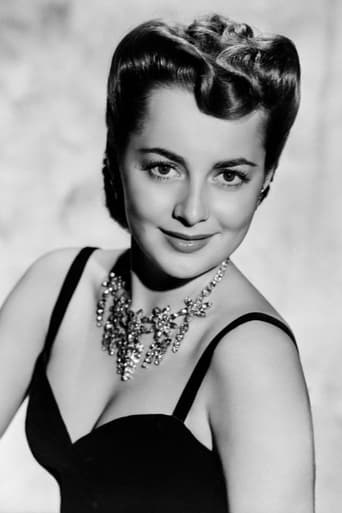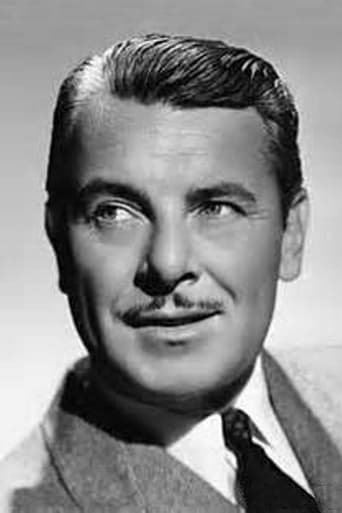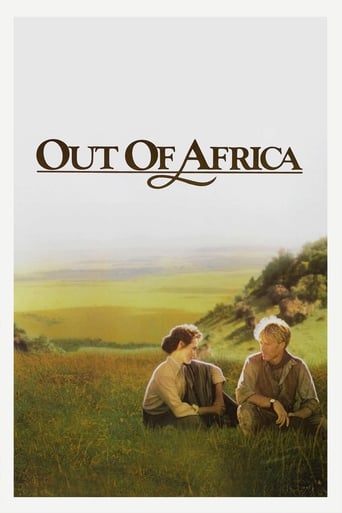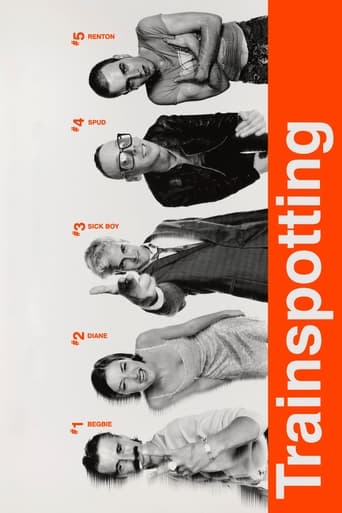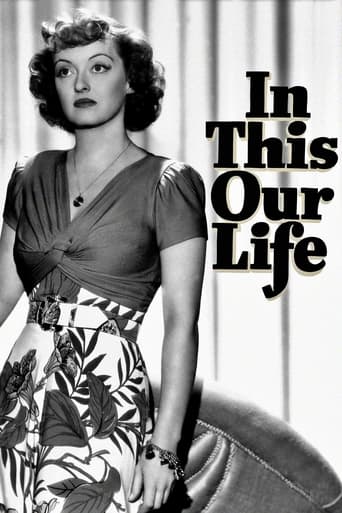
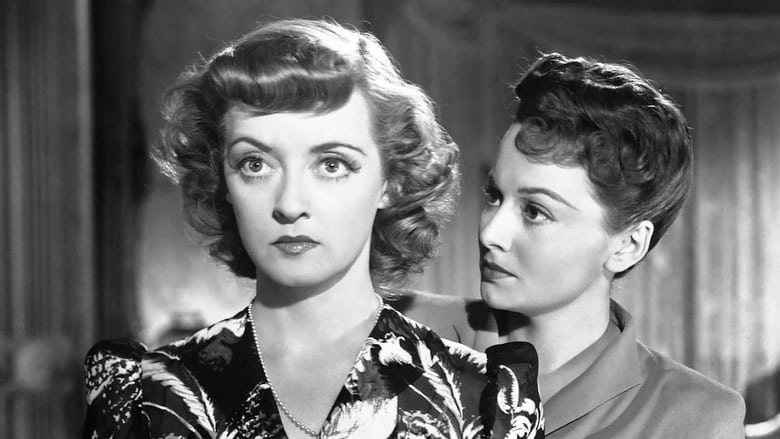
In This Our Life (1942)
An unhappy, self-centered woman runs off with her sister's husband, wreaking havoc and ruining the lives of those around her.
Watch Trailer
Cast


Similar titles
Reviews
Maybe I shouldn't admit this, but this is one of my all time favorite Bette Davis films from her Warner Bros glory years. Southern decadence at its finest! Bette steals her sisters' husband then drives him to suicide, dances just out of reach of her old rich lecherous Uncle who always brings her gifts - "It's in my pocket, you have to reach for it!" Her rich and repulsive uncle got rich by tricking her father into overextending himself in the depression, then taking the whole business over, all but cutting him out. All this and more in the 1st 20 minutes! Bette is the spoiled southern tart who doesn't give a fig about anybody but herself; The kind of fatale the Bette could do with perfection. She plays her confrontation scenes at 110% intensity; I feel it's PERFECT for her character, not overacted! She is simply rotten to the core! Go, Bette, Go! Bette and her sister, played here by Olivia De Havilland, have terrific chemistry. And as a special treat, we get Billie Burke (Glinda the good witch) playing their neurotic, bed-ridden, chemically addicted mother. See it, See it, and for God's sake, SEE IT!
One of the plus factors about boxed sets featuring one actor, director, etc, is that nine times out of ten they are able to demonstrate any versatility they may possess and this is borne out by the five Bette Davis titles I bought this week inasmuch as that on two succeeding evenings I was able to watch one of her most selfless performances in Watch On The Rhine followed by the bitch from Hell in In This Our Life, John Huston's second film behind the camera after The Maltese Falcon. With a blonde wig and made up to resemble Betty Boop, Davis tears through the film like a twister looking for Kansas. She thinks nothing of brushing aside her husband-to-be George Brent to run away with sister Olivia de Havilland's husband, played by the ultra wooden Denis Morgan, hands down the weakest actor in the movie. Having driven him to suicide she goes back home to have another crack at Brent, now in a strong and loving relationship with de Havilland. When that fails she drives off in a high-speed huff, kills a child, severely injures its mother and blatantly lays the blame on an innocent black boy - a fine performance by Ernest Anderson. For most of her life she had enjoyed a semi-incestuous relationship with indulgent Uncle Charles Coburn but when he too, declines to help her beat the dangerous driving rap she curses him and wishes him dead. This is drama at its most melo and Frank Craven, Billie Burke and Hattie McDaniels all contribute fine cameos to say nothing of the principals from The Maltese Falcon sitting mute in a saloon as bartender Walter Huston (also uncredited) tries to speak over Davis' ranting. Great meller.
The daring nature of this film becomes evident in an early scene where we learn that old Uncle William (Charles Coburn) has the hots for his niece "Stanley" (Bette Davis), and she plays him for all she can get financially...shades of Lillian Hellman! Director John Huston handles it well, getting this past the censors...I imagine that some movie-goers didn't quite get the implication. But watch the faces of the other characters in the early scene in the parlor! Charles Coburn, one of my favorite character actors, is a totally unlikable character here...not only a lecher, but clearly a business cheat. But he's awfully good at it, partly because he plays the role with suitable restraint to make it believable! But, in the end, the old man is devastated when he learns he has only months to live. Justice is done for one evil-doer in the story.Another actor playing against type is Dennis Morgan, who plays a non-singing, non-comedy role quite well as "Roy's" (Olivia deHavilland's) philandering husband...in love with Bette Davis (Olivia's sister), no less...who he runs away with and marries. Morgan has some atypically strong scenes in this film, but his character commits suicide as a result of depression because of the marriage. Justice is done again.Apparently Bette Davis wanted to play the good sister, but that role went to Olivia deHavilland, mirroring her type-casting after GWTW just 3 years earlier (although she is neutrally good and practical here).George Brent is fine playing the "good guy" married to Davis, the later dating the good sister, though this is not one of his more prominent roles, although he is featured more late in the film and the ultimate good guy lawyer who saves the young Black man.Bette Davis and Dennis Morgan get married, but of course, Bette Davis turns out to be just as bad a wife to Morgan as she was to George Brent, who begins dating Olivia deHavilland. Ultimately, and I do mean ultimately, Davis is in a hit-and-run car accident which results in the death of a child, but she accuses a "colored boy" -- actually a man -- who worked for their family for years and is now studying to be a lawyer and working in George Brent's law office. It has been said that those who live by the sword die by the sword. In this case we can paraphrase and say that those who kill by their speeding auto will die by their own speeding auto. Justice is done once again.Frank Craven is excellent as the father of Davis and DeHavilland. Ernest Anderson, as the young Black man is excellent, and though his role is relatively small, it is crucial to the plot. I would imagine Billie Burke was disappointed in her role as the invalided mother. Disappointingly, Hattie McDaniel's role here as not a maid but a mother is minor.There are some other interesting appearances in the film. Walter Huston, the director's father, has a cameo as a bartender. John Hamilton -- Perry White in television's Superman plays a police inspector.This is a good film with good acting by all concerned. And it's worth watching at least once. But it's not a pleasant film. Bette Davis' and Charles Coburn's characters are so unlikable that one cannot have any sympathy toward them. I enjoyed the film and think it was done well, and it's now on my DVD shelf. I enjoy it more since reading the Pulitzer Prize winning novel.
"Your creeds are dead, your rites are dead, your social order too! Where tarries he, the Power who said: See, I make all things new?" – Matthew Arnold Ellen Glasgow's novel, "In This Our Life", opens with the above quotation from Matthew Arnold's 1867 poem, "Obermann Once More". Read that quote again, because it sums up John Huston's filmography perfectly and perhaps highlights best what attracted the director to Glasgow's novel.Surprisingly, however, Huston's film completely revokes the tone of Glasgow's novel in favour for super melodrama. This is Douglas Sirk or Max Ophuls territory, Huston laying on the melodrama fast and thick.Beneath the schmaltz (and the interferences of the Hollywood Production Code, which pandered to the anticipated preferences of white audiences to such an extent that Glasgow's intelligent novel is supremely butchered) one can nevertheless tease out the usual Huston themes. Here we have the birth of the "new southern social order", Huston helming one of the very first films in which a black character is presented in a relatively complex light (or rather, in a role other than comic buffoon, fat mama, salivating animal or domesticated servant).The black character in this case is Parry Clay, an African American youth who is blamed for a hit-and-run accident on a child. The real murderer, however, is a character called Stanley Timberlake, a wealthy white woman who employs Parry as a law clerk. Of course, eventually the truth comes out, Parry is released and Stanley attempts to flee. She runs for it, is pursued by the police, and dies in an auto wreck. Poetic justice.Hilariously, the production code required Stanley's death not because of her false statements, lies, or hit-and-run accident, but because she wrecks her sister's marriage. In the novel, Stanley remains alive, proof of how hard it will be for the New South to overcome the white prerogatives of the Old South. Huston fought hard for this ending, but of course didn't have enough clout (this was his second film as director) to win such a battle.The film's other big flaw is this: Glasgow's novel wasn't a melodrama, but a stream-of-consciousness war between a black family and a white family (the Clays and the Timberlakes). For a novel to give equal consideration to a white and black family was unheard of at the time (people preferred Margaret Mitchell's racist, yet Pulitzer winning, "Gone with the Wind"). Huston's film, however, doesn't heed Glasgow's narrative structure and instead relegates the Clays to the peripheries of the action. "In This Our Life" therefore became just another in a long line of flicks which diminish the African-American experience by making it a footnote in the white experience. Huston tries to make up for this by having Bette Davis, who stars as Stanley Timberlake, play Stanley as though she is "telling the truth". The idea here is to manipulate white audiences to "look on" as the race-rationalising white community would. This helps the film somewhat, but it's not enough.7/10 – Bette Davis is great at performing these larger than life devil women. She's always entertaining. The rest of the film, though well meaning, is bogged down by hokey on screen melodrama and off screen concessions. It would take directors like Fuller and Lumet to further chisel away at Hollywood's "racism" (too strong a word, I know), before exploitation cinema, a product of various civil rights movements, kicked the last bastions of the old order down. Of course a new order was quickly built right back up. But that's another story.Worth one viewing.



